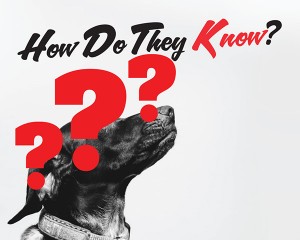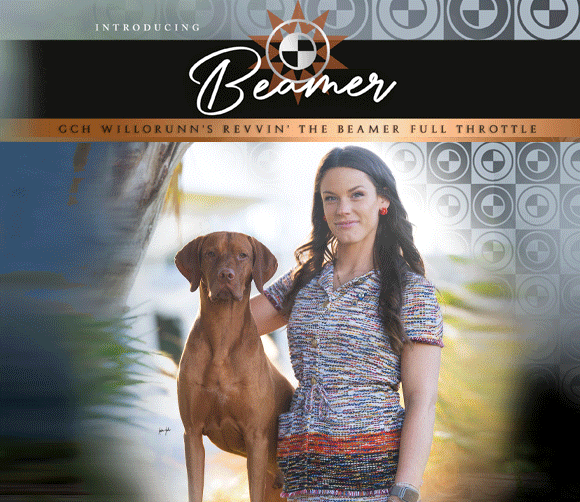How Do They Know?
By: Chris Robinson
 There are numerous stories of heroic canine rescues and dogs that either have been trained or have learned to detect seizures, low blood sugar and some forms of cancer among other health issues. We all know that dogs are sensitive to our emotions. If there is tension and stress in the house or happiness, dogs respond. If you are having a good time, the dog always gets in on the fun. If you are feeling down or having a bad day, they seem to know and will put their head on your lap or a paw on your knee. If you are angry, they know to stay out of your way. But what about all those occasions when dogs do something intuitively, in many cases, things for which they have never been trained or taught? There are times when dogs display a “sixth sense” that is downright spooky.
There are numerous stories of heroic canine rescues and dogs that either have been trained or have learned to detect seizures, low blood sugar and some forms of cancer among other health issues. We all know that dogs are sensitive to our emotions. If there is tension and stress in the house or happiness, dogs respond. If you are having a good time, the dog always gets in on the fun. If you are feeling down or having a bad day, they seem to know and will put their head on your lap or a paw on your knee. If you are angry, they know to stay out of your way. But what about all those occasions when dogs do something intuitively, in many cases, things for which they have never been trained or taught? There are times when dogs display a “sixth sense” that is downright spooky.
A few years ago, doing my real job as an investigative reporter, I interviewed a former U.S. Navy SEAL (Sea, Air, Land) who told me a headshaking- in-bewilderment story about his Belgian Malinois, who had been deployed with the SEAL in Afghanistan and was now his family pet. Before he got to the story of the dog’s unusual behavior while they were clearing a building on that deployment, the ex-SEAL said that the dog had adjusted a lot quicker to civilian life than he had and within a couple of months of the dog’s retirement, was the favorite playmate of not just the ex-SEAL’s kids but all the kids in the neighborhood and was, without a doubt, the very best fielder on the neighborhood ball field. To the kids’ annoyance, he was also almost always fast enough to beat the runner to the base after he fielded the ball. The ex-SEAL said the dog hadn’t been taught this “trick”. He’d just learned it by watching the kids.
That the dog had special intuitive and learning powers became apparent on several occasions during their deployment but espe cially on one day when the SEAL’s fire team was clearing a building of suspected Taliban fighters. His dog had just apprehended a Taliban hiding behind a cabinet grabbing the guy and biting down so hard that he broke one of the bones in the guy’s arm. While some of his teammates attended to the bitten Taliban, the SEAL and the dog moved on to the next room with the dog still amped up from his combat with the Taliban fighter. The room was empty except for what appeared to be a bundle of ragged blankets along one wall. The dog approached the bundle, sniffed it a couple of times, gently nosed it once or twice, pawed it very lightly a couple of times and then indicated to his partner that he should investigate the bundle. When the SEAL did, he found a sleeping toddler under the ragged blankets. (Taliban fighters will often use infants and toddlers as “bait” for American special forces in the hope that the military personnel or their war dogs will attack or harm an innocent child to create an incident.) The ex- SEAL said that the dog had never been trained to differentiate between adults and children simply because the bad guys often use children to prey upon the tendency of American service personnel to be kind to kids and they will send children in first to either distract our people before a Taliban attack or to actually harm our personnel. The dog somehow knew that he wasn’t to harm this child but how he knew is something for which the ex-SEAL had absolutely no explanation.
When Elizabeth Barrett’s foundation female Doberman Ariel was finished with the show and obedience rings and with motherhood, she went on to a second career as a companion to an elderly lady who had chronic issues that affected her mobility and hand strength. Ariel had been trained through Open in obedience so picking up dropped items, standing steady to help her new friend get up from a seated position or to bringing her a phone if she fell was easy. Since she was now an “only dog,” Ariel loved all the undivided attention and her lady had a great friend and very helpful companion. How great was not apparent until about two years into their relationship when Mardee, Ariel’s human pal, collapsed and was unconscious in the kitchen of her apartment. Although Ariel had never been taught to open doors, she finally managed to get the door to the entrance of the apartment open and then ran up and down the building’s hallway barking until she attracted the attention of one of the other residents. Ariel led the resident to Mardee who was transported to the hospital where the doctors said that without Ariel’s determination to get help for her person, Mardee most likely would have died before she was found. As it was, it was several days before Mardee regained consciousness and found out that she owed her life to her dog. While never trained as a service dog, Ariel instinctively knew something was badly amiss with Mardee and that she had to get help for her. But, Barrett said, she still has no idea how the dog knew what had to be done to save Mardee.
While not a life and death situation, except for the duck, last fall I was hunting on a duck pass with Bo, my Chesapeake, when a duck flew over and by the time I got myself untangled enough in the blind to swing my shotgun, I wound up shooting at the bird through a bunch of overhanging tree branches. I was convinced it was a clean miss, that all I’d killed with that shot was a bunch of leaves. However, Bo, who absolutely never and I mean NEVER breaks on a “no bird,” flat out broke. Not realizing at first that he’d gone because he sits slightly behind me in the blind, just about the time I noticed his absence and was getting ready start speaking to him in the sort of language all dogs immediately understand, he came trotting over the hill with a mallard drake in his mouth. There is no way he could have seen the bird fall because I didn’t see it fall and I was looking at it albeit through the leaves. What’s more, he was looking in the opposite direction when I fired the shot. He couldn’t have heard the bird hit the ground because there was a fairly stiff wind blowing in our faces. For that same reason plus it fell well behind the hill in back of us, he couldn’t have scented the bird. Yet he knew there was a bird down. How he knew remains a mystery.
Lin Gelbmann, who has both master hunter Labradors and Standard Poodles, was hunting pheasants with one of her Labs and a friend who had a Golden Retriever. When they approached a cattail marsh, both dogs got very excited. “I sent Roux, my MH Lab into the cattails. All of a sudden she came shooting out of the cattails backward as fast as she could back up. She was a superb pheasant dog so I knew there was no bird in there but something had certainly spooked her. My friend didn’t believe it and sent her Golden into the cattails as she was sure her dog would find the ‘bird.’ Well, the ‘bird’ was a skunk and the Golden got seriously sprayed. What has always puzzled me was how did Roux know to not only leave the skunk alone but get away from it as fast as she could? To most sporting dogs, skunks are irresistible and she had not been trained to avoid skunks. What’s more, this was the first time she had ever encountered a skunk so it wasn’t a case of her having been ‘skunked’ and learned her lesson. She just somehow knew that in a clash between a dog and a skunk, the dog was likely to be the loser.”
It has long been known that dogs have an outstanding ability to detect natural phenomena. They can feel and smell the changes in the air when bad weather is brewing and, unlike most humans, they are very sensitive to changes in barometric pressure. They can hear or feel thunder long before any of their people do and many dogs show their nervousness by running from person to person, whining or barking. My nephew’s Miniature Poodle gives his family advance warning when the San Andreas Fault is about to start slipping. He’s at least as good and maybe better at detecting earthquakes than the scientists in the seismology lab at the California Institute of Technology since a good half hour before the dishes start rattling and the chandelier begins to sway, the dog gets very agitated, running through the house barking and physically trying to drag my nephew and his wife out of the house. It’s happened twice just before an earthquake so the dog’s actions are no fluke. The first time, they wondered what was bothering the dog. The second time they knew and didn’t “resist” his efforts to get them outdoors to safety. The dog clearly has not been trained to be an earthquake detector. He just seemed to know, long before the first time a tremor hit, that danger was coming and he needed to get his “pack” to safety.
The natural intuition that dogs possess is one of the reasons they are known as man’s best friends. For centuries, dogs and their lupine ancestors had to react quickly to certain situations in aggressive ways in order to protect themselves from danger. This ability survives in modern dogs and they still rely on these instincts to protect themselves and their owners.
Duke, Bo’s maternal great-granddad, never met a person he didn’t like except once. We had stopped overnight on our way to Saskatchewan on a mission to uphold my oath to defend the United States against all enemies foreign and domestic, in this case invasion by Canada, snow, Ross and white-fronted geese. Since we wanted to get to the west edge of the province before the geese started heading out for the evening feed, Duke and I were out walking at 0500—Duke to take care of his morning toilet needs and me to try and wake up enough to not be a menace on the highway— when we were accosted by a police officer demanding to know what we were doing. Since the motel was less than a hundred yards away and the dog was on a leash, it should have been obvious to the densest individual what we were doing. But, even though the cop was really a nasty sort, I was polite since I’d learned early in my career that it was imprudent to antagonize someone wearing a badge and carrying a gun especially when that person is already pretty testy. Still, I was irritated by his belligerence even though I tried not to let it show and I chalked it up to him being tired and cranky at the end of night duty.
Duke, however, took an instant dislike to the cop, actually showing his teeth, growling at the guy and generally indicating that if the cop made a move in my direction, he was going to tear him apart. To say I was stunned by the dog’s actions would have been a vast understatement. While, like many Chesapeakes, he was sometimes a bit standoffish initially with strangers, he had never, ever been anything but friendly to everyone he met. Although I’m usually pretty quick to accurately size people up, a necessary skill in my work, this time the dog was a whole lot sharper than me.
A couple of years later, I had occasion to again be in the same city on an assignment. While waiting to interview two detectives who had worked on a case that was part of my story, I got to chatting with one of the department’s canine officers and the conversation led to how perceptive dogs are. He said his German Shepherd, who I was petting, ear scratching and playing with at the time and who was responding to my attention with furious tail-wagging and dog kisses, seemed to instinctively know immediately, before he ever said anything to the dog, whether someone was “good” or “bad.” I said, “Funny you should say that,” and mentioned my encounter with the nasty cop along with Duke’s reaction. The response from the canine officer was, “Your dog is an astute judge of character.” When I said, “How so?” he informed me that the bad tempered cop had been convicted less than a year after Duke and I had our brush with him of brutally assaulting a young woman nearly killing her.
So while dogs may not seem like they are terribly smart when they’re chasing their tails, in many ways they are very clever creatures. Although they are not able to speak any human language, dogs are intuitive protectors who get their messages across without words. They also have an eerie “sixth sense” about things that are important to them. All in all, they are pretty remarkable animals and humans are indeed fortunate to have them as our companions and pals. Although mistakenly attributed to former President Harry S. Truman when it actually first appeared in a 1975 theatrical production about Truman titled “Give ‘Em Hell, Harry,” the quote, “If you want a friend in life, get a dog,” is nonetheless even more true in the real world than it was in the make-believe world of the playwright.
Short URL: http://caninechronicle.com/?p=280267
Comments are closed












